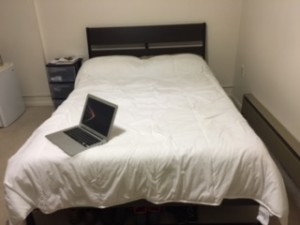
Reject the basic assumptions of civilization—especially the importance of material possessions.
–Tyler Durden, Fight Club
I’m sure you’ve all seen the movie, at least I hope. If you haven’t read the book, I highly suggest it. I’ve read it a few times, along with millions of others. You won’t be disappointed.
Growing up I didn’t have much. For most of my childhood, I shared a room with my little sister and all of my possessions fit in/on a corner desk we had. It was comforting. I would organize everything so that each something had a somewhere it belonged. I cleaned it once a week. I didn’t have much, but what I did have was functional and efficient. It fit together like a toolbox.
Anytime I didn’t have to be home, I wasn’t. I lived with quite a few different people throughout my life. I spent an entire summer at my friend Shawn’s, the next summer I lived at my friend Danny’s. The following year I stayed at my grandma’s with my cousins. The next year, I lived with my cousin from this post. Then I lived with my uncle when I graduated at 17.
The moral of this terribly put together story is that I spent the majority of my life living out of a bag or two. It was simple. I had what I needed and, more importantly, I knew what I didn’t need. I want you to read that last sentence a few more times. I knew what I didn’t need.
I joined the Air Force. Throughout boot camp we were only allowed to have what they determined was needed. Honestly, I feel like we had too much stuff.
When I went to tech school in Wichita Falls, TX I called a small college dorm room my home for the next 5 months. My possessions expanded to include civilian clothes and that’s all. I got rid of some of the gear they issued us because, like I said before, you don’t need 8 pairs of the same socks.
When I moved to Tacoma, WA. My room was about the same size but this time, it was my own, so technically I had two times more space. Did I fill it? No. I used the dresser and other furniture they gave us and instead of having shit everywhere else due to having way too many clothes, all of my possessions fit inside the drawers. It was a clean, minimalist “apartment”.
This is my room today. I just started school at a large university and I couldn’t be happier to be living in this space. Behind me is a closet, a bathroom with a standup shower, and a small desk. When I signed the lease you would have thought that I just purchased a mansion by how excited I was. The simplicity of having only the bare essentials, for the most part, far outweighs any type of convenience or preparedness of having “everything you could ever need.”
Owning a kitchen utensil for each type of fruit for instance. You know how I cut fruit? With a knife. I’ve never had a problem, I don’t care to “cut a fruit salad in half the time”. Have you ever tried to clean any of those things? Yeah, it takes half the time to cut the stuff but takes 10 times longer to clean after. Tell me again how it’s saving you time…not to mention the added space it takes up. Oh look, no we need a bigger kitchen//apartment//house.
Wash, rinse, repeat.
Oftentimes you’ll see ads for products that are meant to make your life easier. 90% of the time (made up statistic) they end up collecting dust or become more of a hassle (see above) than they’re worth. Simpler is always better. For processes, instructions, user interfaces (why is iPhone so popular?), plans, engineering projects, etc. The more moving parts there are, the more chances it can screw up.
Be honest, is there any better feeling than laying down under a dryer-warmed blanket and on top of fresh sheets? What if there was a way that we could get that same feeling at any time of day? Well, there is. Read on.
If you’re anything like me, waking up to a clean space feels right. Not having to step over things to push your way through your bedroom or home just makes life that much easier, allowing you to start your day without a hitch.
Here is Scenario 1
The dishes are clean, so making and eating a healthy breakfast comes second nature. Getting a shower and dressing up happens in record time because everything is just where it should be.
What if you hit a little traffic on the way to work? No big deal, it’s a beautiful day and what’s a little traffic going to hurt?
Your after-work bike ride goes smoothly because your bicycle is easily accessed in the garage, and you bike shoes are right there hanging on the handle bars.
Scenario 2
Upon waking, you step out of bed and your cold, barefoot lands directly on that lamp switch you’ve been meaning to put back on. You make your way downstairs, excited to cook up your signature breakfast bowls only to find there are no clean bowls. Oh well, you can always eat off of a plate. You get out your ingredients and realize you must wash the knife and spatula before you can prep. Luckily, you check the skillet because it has remnants of last night’s supper on it, you wash that too.
Before you know it, you’re running behind schedule and have to rush through your morning shower. There’s toothpaste all over the bathroom sink, the mirror is dirty so it is nearly impossible to floss and there are no clean towels to dry off with so you do your best with a couple of hand towels.
Traffic isn’t bad; it’s just slow enough to get your blood boiling. By the time you make it into work, you’re already exhausted.
Living in a world of clutter day in and day out wears on you, edging you into learned helplessness and ultimately depression.
Cut if off before it can get ahead of you. If you’re already battling depression, this is yet another chance to make up some lost ground. In a study undergone by researchers at UCLA, there was found to be a clear correlation between viewing your living space as cluttered and full of unfinished projects and depression. They compared participants’ answers to certain word choices synonymous with clutter and an unfinished house. Those who used words in those categories most often had a higher instance of depressive symptoms and overall feelings of stress than those who saw their home as neat, orderly and well put-together.
The sample size was quite small, only 60 participants, however, science usually spends a lot of time taking anecdotal evidence and using a controlled setting to either prove or disprove its effectiveness. Also, causality can be a large factor in the study’s findings. Do those who are already suffering from depression live in more chaotic environments or do their homes cause and/or aggravate their symptoms?
I think that it can be a little of both. It goes back to the negativity spiral-down phenomenon.
When you’re not feeling yourself, you will be more likely to let your daily chores slide.
As your surroundings depreciate, it does nothing but worsens your disposition while you’re in them.
The worse you feel, the worse your home becomes. I’ve both felt this personally and seen it happen to a few people who I am very close with. It really is amazing how big of a boost you can get just from getting your place back in ship shape.
How to get back into the habit of keeping a clean space?
Just knowing how much better you will feel after doing so should be motivation enough to get started with at least a small step. Just wash the dishes, put the dishes away, or maybe even just wash one dish. It all starts with taking that first baby step, that’s where motivation is your best friend.
Motivation will only get you so far, it’s your acceleration, your 0-60. After you get there, it’s all about maintaining. This is where habits take over.
The easiest route to building a habit, in my experience, is to attach the desired action or behavior to an existing habit, regardless of what that habit is. Maybe you’re a smoker (I won’t tell you something you’ve heard a million times already, don’t worry). Every time you light up, carry a rag with you and wipe things down. If you only smoke outside, bring a broom or a trash bag and clean up your porch or stoop.
Ideally, you will want to leverage good habits but starting is the most important lesson here. Each morning I wipe down the bathroom sink and faucet while I brush my teeth. It’s small, but when compounded over many other habits, those quick wipe-downs cover nearly my entire apartment. Rarely do I have to spend hours on end cleaning because nothing is neglected!
While I’m cooking on the range, I use a 50/50 mix of white vinegar and water with an old cloth and wipe down the stovetop.
While I’m cooking breakfast, I listen to my podcasts or audiobooks and wash each utensil as I use it. By the time my food is done, everything is clean and the only thing left to wash is the skillet itself. The only trick for the skillet is to put soap and water in while it is still warm, brush it out, rinse, and wipe down. It takes all of 30 seconds to do and I will usually do it between bites.
Incorporating your new-found cleanliness into your daily habits is key.
If you look around and are able to describe your bedroom, apartment, or 5 bedroom house as clutter, overgrown, unfinished, unorganized, or any other words in the aforementioned study, take 5 and see where you can spend seconds here and there to save hours down the road and your mind and well-being in the meantime.
Depression can and is effectively controlled and even cured by tweaking simple, daily activities that turn into a lifestyle free of the chains of depression and anxiety.
For other tips and tricks on how to get started building a habit of clean, check out the following book by David Allen. I’ve read it myself and definitely recommend it to all of you.
Have you seen success clearing up the clutter in your life? Please share below 🙂

